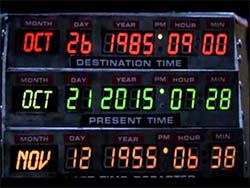
"Back to the Future Day" is rapidly approaching.
This fall, expect to see an onslaught of social media posts about how scientists and engineers have failed us because they haven't invented hover boards, self-drying clothes, holographic sharks, or flying cars. These sorts of Back to the Future memes have been showing up on social media every October for the past few years, often with the dates misquoted. These posts also tend to lament the lack of the nifty technologies showcased in Back to the Future.
And it isn't just Back to the Future that makes people get all nostalgic for the science fiction technology of yesteryear. At the turn of the century, people also bemoaned the huge gap between the manned spaceflight program depicted in Stanley Kubrick's film adaptation of Arthur Clark's classic novel 2001: A Space Odyssey. We also don't have food in the form of pills, or robot butlers, or lightsabers, or holodecks, or wrist phones either. Oh wait, we do have wrist phones, so we can check that one off the list.
But maybe the tech that we do have is actually better than what is depicted in contemporary science fiction movies.
Here's what bothers me: the same people who use their smart phones to post these "Back to the Future Day" memes to Facebook, and demand that scientists get off their lazy butts and build a working hoverboard, often take the technology that we do have for granted. Remember that Marty and Doc Brown had to coordinate their efforts to steal the sports almanac from Biff using walkie talkies because the universe depicted in Back to the Future hadn't even conceived of the idea of a useful portable phone.

If only Marty and Doc had cell phones
Granted, the network to use that phone wouldn't have existed in 1955 or 1985, but that isn't the point. Even in 2015, future Biff Junior and his gang have to go looking for Marty Junior in the diner to find out if he would join them in their criminal endeavors. Nowadays, that would probably be accomplished with an email or txt message, but those future kids didn't have the tech for that, so they had to wander around town actively looking for each other.
The point that I'm trying to make is that many science fiction stories made false predictions about where the advances in technology would occur. They make grand predictions in one field (flying cars or warp drives), but completely fail to anticipate potential advances in other fields (networking or computer UI). Real science may not have developed antigravity fields for hoverboards, but it has produced a consistent and exponential increase in computer power and connectivity that very few science fiction writers had anticipated.
Computers, smart phones, and the internet have become ubiquitous in our culture, giving everybody virtually instant and unlimited access to information and the sum of all human knowledge, and fostering intercontinental communication and collaboration. And this can be carried around at your fingertips at all times. Unfortunately, this also means that people have instant access to virtually unlimited misinformation, but there's always a price for progress.
You don't have to come from the 23rd century (like Mr. Scott) to think keyboards are "quaint".
I don't know about you, but I much prefer my laptop and cell phone over having a stupid hoverboard - say nothing of the internet infrastructure and protocols that allow me to write this very blog. Heck, I can't even skateboard anyway (though I do snowboard - very poorly). I'd also much rather have one of the self-driving cars that is set to hit the road within the next few years than to have a flying DeLorean. Letting the car drive itself so that I can turn commute time into productive work or leisure time is way more appealing to me than having to pilot my car through controlled inter-city airspace and having to worry about other drivers merging into my lane from above or below, instead of just left or right. Not to mention the stress and terror of getting caught in the turn radius of a semi-truck and the turbines of a 777 jet liner.
The ubiquitousness of information technology is also considerably beneficial to society - much moreso than some novel hoverboard. Before you complain about digital media rotting the minds of our modern youth, just think of all the 12-year-olds building robots in school, writing their own top-selling mobile apps, or providing professional-quality tech-support to their parents. The accessibility of information means that more people (including those in traditionally-underpriviliged communities and developing countries) can educate themselves instead of relying on failing or non-existent public school systems.
"There is a single light of science, and to brighten it anywhere is to brighten it everywhere."
- Isaac Asimov

It's OK Spock, I'd cry too if I lived in a
future with those archaic computers.
More than ever, innovators and entrepreneurs can literally come from anywhere, regardless of their background and upbringing. Heck, the modern smart phones and tablets that we have now make the technology used by Mr. Spock and even Captain Picard look quaint.
So as October 21st approaches, think twice before sharing the "where's my hoverboard?" memes, and take a moment to appreciate the rapid, history-changing advances in technology that have taken place. I'll take the internet, my Android phone, and gaming laptop over some silly hoverboard any day.
And maybe those hoverboards and warp drives won't be far behind...